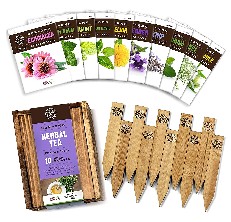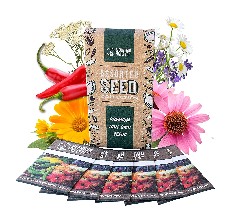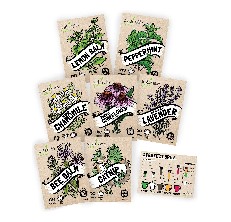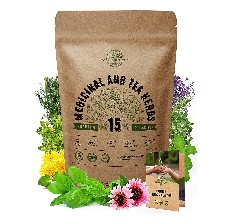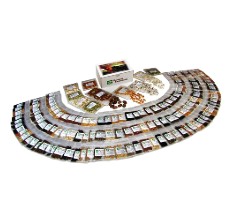If you want to live a healthier lifestyle, you might be thinking about taking a more natural approach to wellness. For instance, when you come down with a sickness of some kind, instead of taking manmade prescriptions, you can try adopting one of the many inexpensive methods of reducing your symptoms. Depending on the ailments you are facing, a medicinal herb garden could be an excellent solution to your woes. If you asked us what our favorite option is, we’d say none other than the Garden Republic Medicinal Herb Garden Seeds!
Our Top Picks For Medicinal Herb Garden Seeds
Buyer's Guide: The Best Medicinal Herb Garden Seeds
Now you’ve seen our selection of the best medicine herb seeds you may want to do a little of your own research to ensure you purchase the best product for your needs. Continue reading to see our tips on how to choose the best seeds for your needs.
Consider the Hardiness Zones in Your Garden
The temperature range that is ideal for a seed to grow in is called a hardiness zone and is signified by a number between one and thirteen. Each number represents a range of temperatures the seed will grow in.
Zone 1 represents seeds that will grow in the coldest temperatures between -60-degrees Fahrenheit and up to -50-degrees Fahrenheit. The zones then go up in 10-degree increments, with zone 13 being the hottest zone. Zone 13 represents seeds that will grow between temperatures of between 60 and 70-degrees Fahrenheit.
Find seeds that will match the growing condition of your home or your garden. Similarly, consider the ideal lighting conditions needed for the plants you wish to grow. You may want a variety of plants to suit the shaded sections of your garden as well as some plants in direct sunlight.
Amount of Seeds and Germination Rates
The more seeds you receive, the more likely you will get some germination. However, if you sow many seeds and they all grow, the plants will not survive as there may not be enough space or nutrients in the soil to support them.
Instead, you should look for a medium amount of seeds with high germination rates. Germination rates describe the percentage of seeds that sprout. Look for seeds with a germination rate of 90% or more.
Growing Information Provided
Look for a product with plenty of growing information. This may be found on the back of the seed packs, or the product may give you access to online content. Some may even invite you into a community where you can speak to other customers online who will share their tips on what has worked and not worked for them.
Some products also provide you with information on how you can use the herbs once grown and when best to reap what you have sown.
Heirloom, Non-GMO, Organic
Like breeding cats and dogs, plants can also be bred similarly. Heirloom seeds come from a breed of plants that is 50 years or older. This gives you access to often more interesting flavors than you may find in the store, as well as a higher potency of the qualities you may be looking for in certain herbs.
Non-GMO produce comes from a plant that has not had any genetic engineering. Some plants are genetically engineered or modified to create sweeter tasting or seedless fruit for example. Many people prefer to keep their food and their seeds more natural.
Similarly, organic seeds come from plants that do not use unnatural pesticides and fertilizers. This is better for eco-systems and reduces the likelihood of having an allergic reaction to the food.
Types of Herbs and Their Properties
There are many types of herbs you can grow from seed at home. Others are better purchasing as seedlings as they take a long time to grow from seed. Continue reading to learn what herbs you can use for different ailments.
Best herbs for relieving the symptoms of a cold
Several herbs relieve the symptoms of a cold, cough, and the flu. Some of the following herbs will also relieve congestion.
- Basil
Basil is full of immunity-boosting antioxidants.
- Garlic
Garlic is anti-inflammatory, anti-fungal, and anti-viral. It is also extremely delicious.
- Rosemary
Rosemary soothes a sore throat and can even relieve headaches. When you inhale the steam from rosemary water, it is known to relieve congestion.
- Ginger
Ginger can break a fever and can ease throat pain when gargled in tea.
- Thyme
Thyme is a great aid in removing mucus build-up. It is rich in vitamins and has anti-bacterial and anti-viral properties.
- Licorice root
Great for coughs and several other ailments, including digestive problems and menopausal symptoms.
Best herbs to relieve pain
Many herbs relieve pain by reducing inflammation or numbing affected areas.
- Nettle
Nettle will numb your throat and provide some relief when you have a sore throat.
- Rosemary
Rosemary reduces pain when you have a headache.
- Eucalyptus
Inhaling steamed eucalyptus can help relieve pain around the body. However, it should not be used by asthmatics as it can cause an asthma attack.
- Feverfew
Feverfew is known to relieve arthritic pain, stomach aches, and tooth pain. It is also known to increase breast milk in lactating mothers. Taking this herb preemptively will reduce the number of migraines you get. However, you should consult a medical professional before using this herb, as it has many side effects.
Best herbs for stress relief and sleep issues
- Valerian root
Valerian root is the main ingredient in many sleeping tablets. It will help you drift off to sleep and have a better sleep quality.
- Lavender
Lavender is not to be ingested but used in the bath or topically to help you relax. It is known to reduce stress and help you drift off to sleep.
- Chamomile
Chamomile tea will also help you relax and tastes delicious.
People Also Asked
What herbs can I give to my dog?
It is important to note that some herbs will be toxic to your fur baby, so make sure you do plenty of research before you give any herbs to your dogs. The following herbs are safe to put in your dog's food in small quantities: rosemary, thyme, and fennel.
What herbs can I harvest in winter?
You may be surprised by how many herbs can be harvested in the winter. This depends on how cold the winter gets, of course. Russian Tarragon can provide leaves in the winter if you plant it in the fall. Korean celery will also yield leaves in winter. Both herbs prefer well-drained soil, so you may want to add pebbles or small stones to the soil before planting your seeds.
Is it worth purchasing a grow light?
Most herbs flourish as long as they receive plenty of light. A lightbox is a must if you live in a dark space without much access to natural light. However, lightboxes can also be beneficial for anyone in a light-filled home because the lightbox will make up for cloudy days and rainy seasons.




